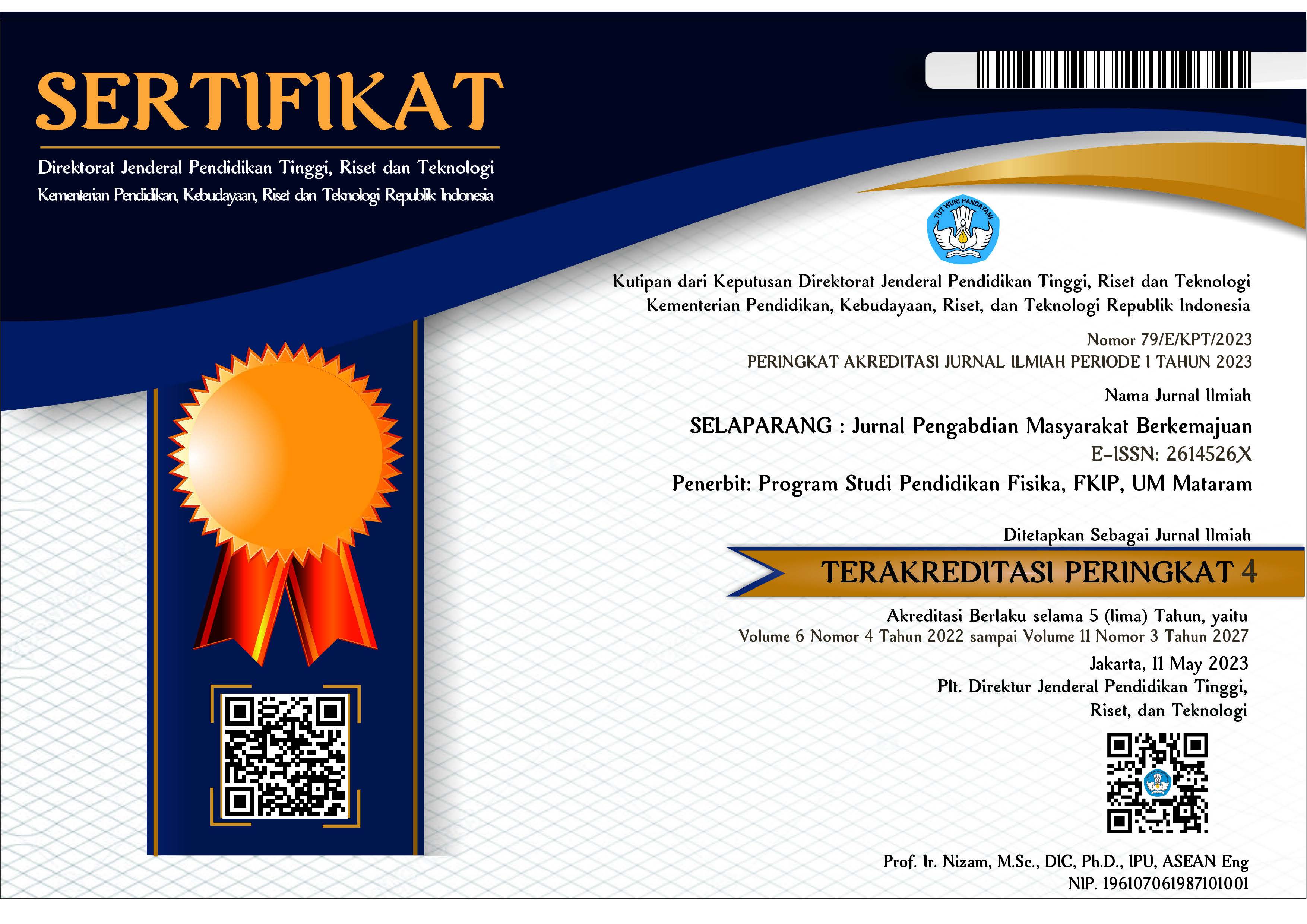EDUKASI KESEHATAN PADA REMAJA DALAM PENTINGNYA GIZI SEIMBANG DAN AKTIVITAS FISIK DI ERA PANDEMI COVID-19
Abstract
ABSTRAK
Pandemi COVID-19 di Indonesia sangat memberikan dampak pada berbagai sektor di seluruh dunia, tidak terkecuali kenaikan frekuensi Penyakit Tidak Menular. Penyakit tidak menular (PTM) adalah penyakit atau kondisi medis yang tidak dapat ditularkan dari satu individu ke individu lainnya atau dengan pengertian lain merupakan penyakit yang bukan disebabkan oleh proses infeksi (tidak infeksius). Masalah gizi lebih atau obesitas merupakan masalah global dan menjadi masalah utama di negara-negara maju dan berkembang karena mengalami peningkatan tiap tahun yang berkaitan dengan penyakit tidak menular. Dari survei awal diketahui pengetahuan para remaja masih kurang terkait Pentingnya Gizi Seimbang dan Aktivitas Fisik Dalam Upaya Pencegahan Penyakit Tidak Menular (PTM) . Tujuan dilakukannya kegiatan ini adalah untuk meningkatkan keselamatan para remaja dalam masalah gizi dan penyakit tidak menular khususnya di era pandemi covid-19 sekarang. Kegiatan ini dikemas dalam bentuk pemberian materi dan video tentang Pentingnya Gizi Seimbang dan Aktivitas Fisik Dalam Upaya Pencegahan Penyakit Tidak Menular (PTM) di Era Pandemi Covid-19 . Disetiap akhir kegiatan dilakukan evaluasi terhadap pemahaman remaja. Hasil dari kegiatan pengabdian kepada masyarakat terdapat sebanyak 68% pemahaman remaja dalam katergori baik, cukup sebanyak 20% dan kurang sebanyak 12%. Kegiatan berjalan dengan baik dan perlu adanya monitoring lebih lanjut.
Kata kunci: Penyakit Tidak Menular (PTM); gizi seimbang; aktivitas fisik; covid-19
ABSTRACT
The COVID-19 pandemic in Indonesia has had a profound impact on various sectors around the world, including the increase in the frequency of Non-Communicable Diseases. Non-communicable disease (PTM) is a disease or medical condition that cannot be transmitted from one individual to another or in other terms is a disease that is not caused by an infectious (non-infectious) process. The problem of over nutrition or obesity is a global problem and is a major problem in developed and developing countries because it has increased every year related to non-communicable diseases. From the initial survey, it was found that teenagers' knowledge was still lacking regarding the importance of balanced nutrition and physical activity in preventing non-communicable diseases (PTM). The purpose of this activity is to improve the safety of adolescents in nutrition and non-communicable diseases, especially in the current Covid-19 pandemic era. This activity is packaged in the form of providing materials and videos about the Importance of Balanced Nutrition and Physical Activity in Efforts to Prevent Non-Communicable Diseases (PTM) in the Covid-19 Pandemic Era. At the end of each activity, an evaluation of the understanding of adolescents is carried out. The results of community service activities were as much as 68% of the residents' understanding was in the good category, 20% enough and 12% less. Activities are running well and further monitoring is needed.
Keywords: Non-Communicable Diseases (PTM); balanced nutrition; physical activity; covid-19
Keywords
Full Text:
PDFReferences
Ali, W., Onibala, F., & Bataha, Y. (2017). Perbedaan Anak Usia Remaja Yang Obesitas Dan Tidak Obesitas Terhadap Kualitas Tidur Di Smp Negeri 8 Manado. Jurnal Keperawatan UNSRAT, 5(1), 114296.
Gifari, N., Kuswari, M., & Azza, D. (2018). Pengaruh Konseling Gizi Dan Latihan Stretching Terhadap Perubahan Asupan Gizi Dan Status Gizi ( Effect of Nutritional Counseling and Stretching Exercises Programs on Nutritional Status and Nutrition Intake ), 2(1), 29–40.
Kementerian Kesehatan RI. (2018). Laporan Riskesdas 2018. Laporan Nasional Riskesdas 2018 (Vol. 53). Jakarta: Badan Penelitian dan Pengembangan Kesehatan (LPB). Retrieved from http://www.yankes.kemkes.go.id/assets/downloads/PMK No. 57 Tahun 2013 tentang PTRM.pdf
Kurdanti, W., Suryani, I., Syamsiatun, N. H., Siwi, L. P., Adityanti, M. M., Mustikaningsih, D., & Sholihah, K. I. (2015). Faktor-faktor yang mempengaruhi kejadian obesitas pada remaja. Jurnal Gizi Klinik Indonesia, 11(4), 179. https://doi.org/10.22146/ijcn.22900
Priyo, Titus H.; Par’i, Holil M; Wiyowo, S. (2017). Penilaian Status Gizi. Badan Pengembangan dan Pemberdayaan Sumber Daya Manusia Kesehatan. Retrieved from www.bppsdmk.kemkes.go.id
Thaddanee, R., Chaudhari, U. R., Thakor, N., Thaddanee, R., & Pediatr, J. C. (2016). Prevalence and determinants of obesity and overweight among school children of Ahmedabad City , Gujarat : a cross sectional study, 3(2), 606–611.
Twig, G., Yaniv, G., Levine, H., Leiba, A., Goldberger, N., Derazne, E., … Kark, J. D. (2016). Body-Mass Index in 2.3 Million Adolescents and Cardiovascular Death in Adulthood. New England Journal of Medicine, 374(25), 2430–2440. https://doi.org/10.1056/nejmoa1503840
World Health Organization. (2015). World Health Statistics 2015. Luxembourg: World Health Organization. Retrieved from https://www.who.int/docs/default-source/gho-documents/world-health-statistic-reports/world-health-statistics-2015.pdf
World Health Organization. (2018). Noncommunicable diseases country profiles 2018. Switzerland: World Health Organization. Retrieved from https://www.who.int/nmh/publications/ncd-profiles-2018/en/
DOI: https://doi.org/10.31764/jpmb.v4i3.4791
Refbacks
- There are currently no refbacks.

This work is licensed under a Creative Commons Attribution-ShareAlike 4.0 International License.
______________________________________________________
Jurnal Selaparang
p-ISSN 2614-5251 || e-ISSN 2614-526X
EDITORIAL OFFICE:



















